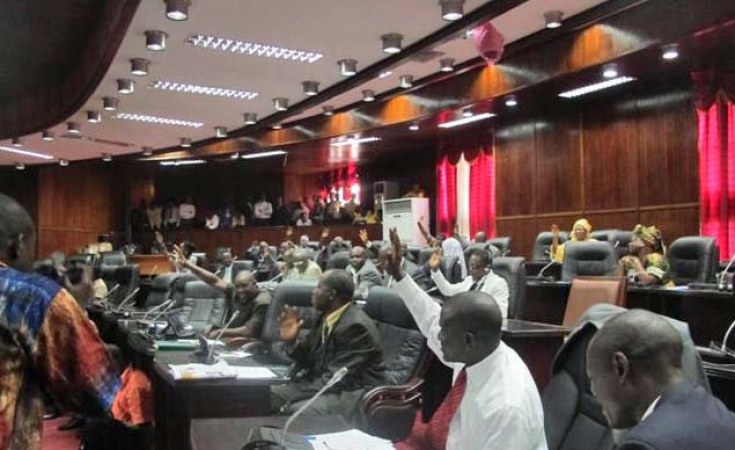The recent resolution by nearly two-thirds of the House of Representatives to remove Speaker J. Fonati Koffa has thrown Liberia's political landscape into turmoil. At the heart of this struggle lies a convergence of personal ambitions, political maneuvering, and, most alarmingly, allegations of bribery involving "public funds". As citizens, we must grapple with the root causes of these upheavals and their implications for our democracy.
Under the 1986 Constitution of Liberia, Article 49 clearly establishes the process for removing the Speaker of the House of Representatives. According to the standing rules of the House, the Speaker can be removed for "cause," but this process must follow due diligence, ensuring transparency, fairness, and adherence to the rule of law. The Constitution stipulates that such decisions must be made with the consent of at least two-thirds of the Representatives, emphasizing that the removal of a Speaker is not to be taken lightly.
However, the current push to oust Speaker Koffa has been marred by serious allegations of bribery. This casts a shadow over the integrity of the legislative process, threatening the very democratic principles enshrined in the Constitution. As Montserrado County Senator Darius Dillon rightly noted, "members of the House of Representatives have the rights and legal powers to remove a Speaker ... but for 'cause,' after 'due process of law."' The allegations of bribery, including the testimony of Rep. Luther Collins, who admitted to accepting US$15,000 to support Koffa's removal, call into question whether this effort is being driven by legitimate concerns or corrupt motives.
In light of these troubling developments, President Joseph Boakai must immediately commission an investigation into the allegations that lawmakers were bribed to support Koffa's removal. This investigation should be conducted by the Liberia Anti-Corruption Commission (LACC) in collaboration with the Ministry of Justice, and the findings must be published promptly. The credibility of our entire legislative process is at stake. As Senator Dillon emphasized, bribery is a felony, and both the "giver and recipient" must be held accountable. The Justice Ministry should not shy away from prosecuting those involved, regardless of their political stature.
Such an investigation is not only necessary for upholding the rule of law but also for restoring public confidence in the legislative process. If left unaddressed, this bribery scandal will further erode trust in our institutions, creating a precedent where political power can be bought and sold with impunity.
At the center of the current crisis is the question: what is the "cause" for which Speaker Koffa's removal is being sought? Some sources suggest that certain members of the Congress for Democratic Change (CDC) fear Koffa's potential rise as a presidential candidate in 2029. There is speculation that his ethnicity -- being Kru -- has also played a divisive role within the party, with non-Kru members, who also have presidential ambitions, opposing his leadership. These political ambitions, however, cannot justify such a drastic action unless legitimate concerns about his conduct or performance as Speaker are presented.
Hence the CDC's claim that the plan to oust the Speaker originated from the ruling Unity Party, whose Vice Standard Bearer, now Vice President of Liberia Jeremiah Koung, is no doubt a prime contender for the presidency in 2029. It is fair to conclude, then, that the mutinous resolution against Speaker Koffa is a perfect storm, conspired and attempted by characters from within both the CDC and the UP, who see him as a common threat to their respective presidential ambitions.
But that's not all.
Speaker Koffa's plan to audit the Legislature from 2005 to the present has also been cited as a factor in his attempted potential ouster. Since 2005, several lawmakers have been accused of siphoning money from the national budget. Some of these have chaired the Ways and Means Committee, wielding immense power over the national budget. It is no coincidence that whoever controls this committee steps into a new realization that the power to control the public funds (the national budget) puts the presidency clearly within one's sights.
Speaking of the Ways and Means Committee, one should not be so quick to accept the narrative that the bid to oust Koffa from the speakership was necessarily sanctioned by President Boakai. Remember the recent US$20 million "budget tampering" scandal, which lawmakers claimed was perpetrated by the Boakai administration? Well, in a CDC-controlled Committee on Ways and Means, under a CDC-majority House of Representatives, it is highly plausible that it was an inside job, exposed by jilted insiders -- which is why the findings of the investigation into the alleged tampering have yet to be made public.
If Speaker Koffa is indeed auditing past budgets and shining a light on corrupt practices, his removal could be seen as an attempt to protect entrenched interests rather than a legitimate effort to improve the functioning of the House. These motivations, if proven, represent a betrayal of the public trust and must be exposed.
The events unfolding in the House of Representatives should serve as a wake-up call for all Liberians. We must demand accountability from our leaders, starting with a thorough investigation into the bribery allegations. Additionally, we must hold our lawmakers to a higher standard, recognizing that we have the power to remove them if they fail to serve The People's interests.
Finally, Liberians deserve to know why exactly Speaker Koffa's removal is being pursued. If this is a matter of political jockeying, The People deserve to know. If corruption is the driving force behind this crisis, those responsible must be brought to justice. The integrity of our Legislature, and by extension our democracy, depends on it.
The time for complacency has passed. Liberia's future is too important to be left in the hands of a corrupt and self-serving few. Let us rise to the challenge and demand the leadership our country deserves.


